Who really owns a 1 on 1 meeting?
Is it the manager's meeting? Is it the team member's?
Who should be in charge of the agenda?
If you read around, you'll see people advocating for a lot of positions.
I've seen some say, "It's the team member's meeting and their job to be adults and come to you with issues.”
I've seen others make the case that, "It's your team and they may not know what a good 1 on 1 meeting is like, so you should set the example by helping drive the meeting and the topics covered.”
The real answer, like most things in life is that it's more nuanced than that. The truth is, a great 1 on 1 meeting is a mix of both.
Today, we look at what I've seen the best managers do, and what we try to help you do in Lighthouse.
To learn more about how your 1 on 1s should develop over time, from building rapport to working through issues and becoming a coach, read our guide: How to Evolve Your 1-on-1s Over Time for Maximum Value.

Who Really Owns a 1 on 1 Meeting? 5 Priorities to Help You Better Navigate Your 1 on 1s together.
It can be hard figuring out how to approach your 1 on 1s. Should you bring an agenda, or let them dictate the meeting?
To help answer that question, below is a list of steps that can help guide you to get the most out of your 1 on 1s – a key list of priorities to help you figure out before and during your 1 on 1s where you should place your focus.
Table of Contents:
- Priority #1: See What They Want to Talk About
- Priority #2: Provide Coaching and Feedback
- Priority #3: Ask Good Questions to Draw out Issues + Better Understand Them
- Priority #4: Take Good Notes!
- Priority #5: Be Accountable to Each Other

Priority #1: See What They Want to Talk About
The first thing you should ask and prioritize in every 1 on 1 meeting is to ask: is there anything they want to talk about?
This comes first no matter what.
If something is on their mind, or important enough that they put it on the agenda, it's probably bothering them (or affecting their work).
That's why you should start the meeting with what they want to talk about *first*. It helps signify that this is their meeting and you value what they have to say most.
This also ensures you don't run out of time in your meeting to talk about what they care about; not getting to do so would discourage them from preparing anything for future 1 on 1 meetings, which defeats the whole purpose of a 1 on 1 meeting.
Even more important, often what they talk about will influence what you want to discuss later.
If you know what issues they're having, or what's on their mind, you can gear the conversation in a direction that helps them get what they want from the 1 on 1. That will reinforce the value they're getting from their 1 on 1 meetings with you and keep them coming back for more.
Equally important, you may get valuable context from them that changes the focus or tone of what you want to talk about; for example, if they tell you they're struggling with juggling too many projects, suddenly your feedback on sloppy work on one of those projects isn't nearly as important as the root cause they just revealed to you.

But first, you need to build rapport
Keep in mind that if you're just starting your 1 on 1s with them, you first need to invest in building rapport with them. You need to build a foundation of trust, and give them the feeling you care about them as a human being in order for you to maximize your 1 on 1 meetings.
Once you've built enough rapport, they'll start feeling comfortable speaking up and letting you know what's on their mind.
Meanwhile, if you haven't built rapport with them yet, they'll likely keep to themselves and won't open up about the real issue / their honest opinion.
Think of it as the difference between what you tell a trusted friend or colleague, versus a stranger on the street. You are unlikely to tell the latter that you're struggling, your frustrations, or ask for help.
While you will occasionally meet a friendly, extroverted person who will help pave the way in building rapport with you, this is the first of many cases where leading the 1 on 1 meeting as a manager can help. It's your job to ask questions to get to know them and build this essential foundation.
Further Reading:
- Check out our comprehensive guide on ways to build rapport here: 82 Ways How to Build Rapport with Anyone at Work.
- The best time to start all this is as you get started in your role, which this post can help with: Managing a new team? Discover what questions to ask when joining a new team.
- And if you want something to share with your team, many managers have referred their team members to this: 7 Essential Tips for Effective 1 on 1 Meetings with Your Manager
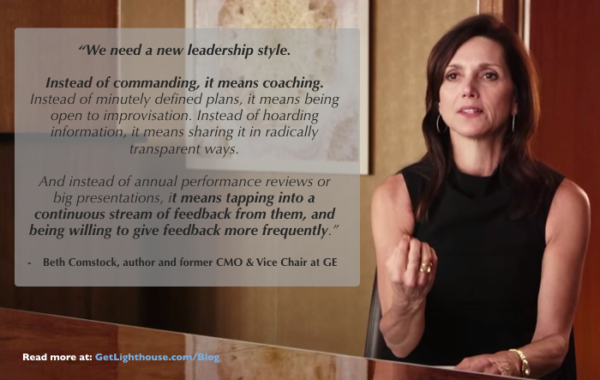
Priority #2: Provide Coaching and Feedback
After handling any issues and discussing topics they want to talk about, or if they don't have anything, your next priority in their 1 on 1 meeting is to focus on giving them coaching and feedback.
As a manager, you're their coach. That means it's up to you to bring up things they could do better, and praise them when they do great work you want to see more of.
How much you coach them should change over time as their Task Relevant Maturity fluctuates according to the work they're doing.
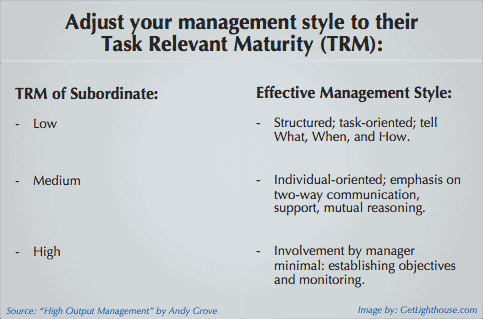
When they're taking on something new, spend more time supporting them hands-on. Help them understand what success looks like, and be there to answer their questions.
Meanwhile, when they're working on something they've mastered, pull back and give them space; trust them to do good work, and avoid micromanaging them.
Realize that just because someone is great at one task or responsibility, it does not automatically mean they're great at something else. This is especially true if you promote them. Always focus on their Task Relevant Maturity relative to the task they're currently working on, not other skills or how long you've worked with them in general.
Your managers need your help, too
A while back, a friend of mine got promoted to manager. It was a big moment for them, but the celebration ended quickly.
Immediately after they were promoted, their manager abandoned them; they no longer had regular 1 on 1s, and it was difficult to get time to talk with their manager. My friend was left to struggle in a role they knew little about (i.e. his Task Relevant Maturity was low– becoming a manager is a career change after all).
Understandably, he got frustrated, and after 6 months of half-hearted support from their manager, my friend quit and went to a new job.
Instead of leaving them to figure it out on their own, their manager should have doubled down and met with them more often while he was in a situation he had a lot to learn about.
Their manager should have spent time digging into issues and giving feedback. With a little trust and belief in my friend, they also likely would have brought up issues they wanted help with, making it easy for their manager to provide much needed support. Instead, the manager's unavailability left them to struggle and ultimately leave.
While it would be great if your team would come to you all the time, take advantage of things like "open door policies" (which always fail), and make coaching them easy, that's far from reality. As Andy Grove reminds us:

Come prepared in your 1 on 1 meetings to give support and coaching, and your team will be more likely to stay and thrive in any role they have with you.
Further Reading:
- Praise is one of the best motivators available, learn easy ways to give praise in our master guide here: Praise Guide: 21 Ways to be more Positive at Work and Give More Praise
- Learn the fundamentals of how to give praise that will really resonate with your team: Effective Praise: The Simple Secret to Motivating Your Team
- Need to give feedback? Learn how to do it in a way people will actually want to listen: 5 Ways to Give Feedback that's Better than the Sh*t Sandwich
- Learn the fundamentals of how to give feedback that your team will understand and make the needed changes: How to Give Constructive Feedback to Motivate & Improve Your Team
- Learn more about the important management concept at the heart of great coaching: Task Relevant Maturity: A Management Concept Great Leaders use Daily
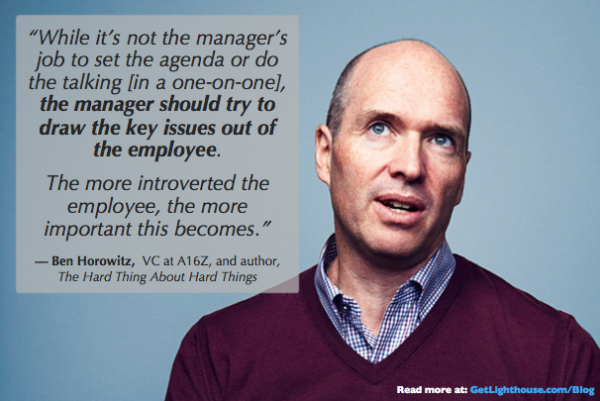
Priority #3: Ask Good Questions to Draw out Issues + Better Understand Them
It would be great if everyone just came to you and spoke directly and clearly always. Unfortunately, that isn't how things typically go.
Think about it: You have a big power dynamic over your team. You could fire them if you don't like their work, punish them by giving them crappy work, or give them a poor performance review. On the positive side, you also determine raises, promotions, and bonuses.
Would you want to admit to your manager that you're struggling?
Even the friendliest of managers can intimidate due to this natural power imbalance that exists. And that's okay. You just have to prepare for it by being curious.
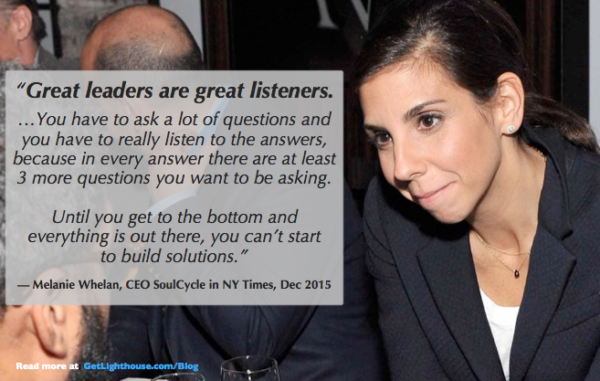
Ask the right questions
Many issues lurk below the surface. You have to take the time to dig by asking the right questions or you won't find out about them before it's too late– and half your team is out the door.
Do you know what motivates and drives your team? Do you really know how happy they are– or not - right now?
People can try to be team players and put on a happy face or go along with a lot in a group setting. You may not know how they really feel if that's all your judging them by.

The beauty of 1 on 1s is that it's private. This makes it much easier for them to open up (with the right questions). If you haven't done this before you may be surprised what you learn.
You can use questions like:
- Are you happy with your recent work? Why or why not?
- What can I do to help you feel more confident or comfortable right now?
- What area of your job do you want to work on or improve?
- Are you happy with your career progress here? Why/why not?
Plus, by being actively curious and drawing out issues, you can help avoid what former Intel Co-founder and CEO Andy Grove calls "zingers”, a personal issue brought up at a bad time:

Over time, as you draw out various issues and work with them to solve them, you'll come to better understand them. And that will help you in all kinds of ways like giving them more effective feedback, finding their rhythm, and knowing the best way to coach them.
And since you took the time to ask, they also then will see you really care. That makes them more likely to volunteer more information and put more things on your 1 on 1 meeting agenda in the future.
Further Reading:
- Not sure what to ask? Get 100+ One on One Meeting Questions Great Managers Ask Their Teams
- Learn more about the importance of curiosity for drawing out issues: Your most important management skill for success
- Struggling to get your team to open up? Learn how managers can be more effective listeners here.

Priority #4: Take Good Notes!
Through all of this, you as the manager need to take the notes, not them. It's their meeting, and as Grove describes above in High Output Management, taking notes shows you value what they have to say.
It's also a reminder to prepare for the meeting. You should bring things to prepare to set an example for them. Things you take seriously and invest in, your team will, too.
Showing up empty-handed and without an agenda sends a very different message to your team than showing up with a detailed 1 on 1 agenda, asking some prepared questions, and listening intently while noting key parts of what they say.
Phrases like, "That sounds important to you, let me write that down” are great for giving you a few seconds to pause and note important points. It also lets them know that you're paying attention, not answering an email, responding to Slack, or doodling.
Equally important (and valuable), a pause like that leads them to pause and then add more on the topic. I've lost count of how many times 10-15 seconds of silence leads to them opening up more on a topic or adding more helpful information or ideas, because we didn't simply rush to the next topic.
When you come to a 1 on 1, bring whatever fits your work style (a notebook, your phone, a tablet, or laptop), and make sure it includes something for your agenda and to take notes. The key is to prepare in a way you're most comfortable with, as that will make you most likely to stick to the habit.
Regardless, the key is you have something, and you use it throughout the meeting to make the most of this precious time.
Further Reading:
- Need more convincing? Learn: Why Managers Should Take Notes
- Struggle to take notes in your 1 on 1s? Read: How to take notes in your one on ones in any situation
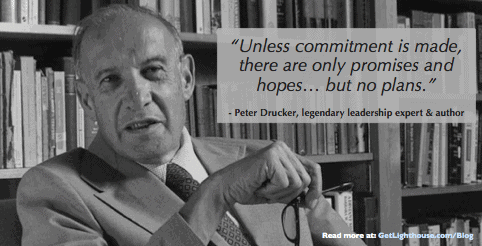
Priority #5: Be Accountable to Each Other
Ultimately the goal of one on one meetings is to help maximize your team member's ability to perform. This can take many different forms:
- Letting them vent about a problem, then helping them address it
- Coaching them in an area of weakness
- Going over recent work and praising them so they know what you like
- Getting buy-in for an important change or project coming and listening to their input to improve it
- Getting to know them better to build rapport and understand them better
- Helping them grow and advance in their career
- And a lot more
However, none of that happens by accident. In fact, it only happens if you make time for it and prioritize talking about it. Otherwise, it's easy to go a full year without talking about many of these things.
Then you end up blindsided by someone quitting, or them frustrated and confused as to why you gave them a lower performance review than they expected. Nothing should ever be a surprise in a performance review.
How to be accountable to one another
The best way to avoid that fate and make real progress during your 1 on 1s is by being accountable to each other. That means:
- You both bring things to talk about in the meetings
- You come prepared, reviewing what was discussed last time (I guarantee they will remember)
- You set clear, actionable next steps for both of you based on what you discuss, so you both know what you are expected to do for next time
- You both do your best to take those steps by next meeting to build momentum and make progress together
- You take time occasionally to zoom out and make sure you're covering a wide variety of topics so nothing is missed.
Just knowing that you're watching their progress and will be checking in next time can help improve their accountability. No one wants to show up empty handed and full of excuses to a meeting with their manager if they want to stay at their job for long.
There's even a name for this behavior. According to the Hawthorne Effect, people behave differently when they know they're being watched. The simple act of giving your attention to this as manager can help improve your team's performance and the quality of your time spent here.
Why not use your attention and focus to help improve your most valuable meeting with your team?
All that time you've invested in your 1 on 1s together will mean nothing if no action is taken between meetings. Make progress together by setting clear expectations and next steps for each of you to do by next meeting. Bit by bit and step by step, you'll see progress and improvement made by doing this.
Further reading:
- Get an in depth look at how to start, run, and make the most of your 1 on 1s with our master guide: One on One Meetings: The Only Guide Managers Need [Free Template]
- Learn our guide about how to motivate a low-engaging employee.
You own your 1 on 1s– but make it their meeting
One on ones are your team member's meeting. They're the focus of the meeting, and anything they bring should be your first point of discussion.
However, it's still your responsibility to ensure that you make the most of the meeting, and demonstrate your interest and investment in them.
Every 1 on 1 meeting will be different. Sometimes, the employee will bring a jam-packed agenda. Other times, you'll have to direct where the meeting goes, and teach them what topics are good to bring up in a 1 on 1.
Throughout this, one thing is constant: you both play an important role in making the most of each 1 on 1 meeting, no matter who brings the agenda.
Ultimately, you'll have to use your judgment to decide what to focus on in each one of your 1 on 1s, and that will change over time. To help with that, we wrote the quintessential guide on how to evolve your 1 on 1s over time for maximum value.
And for more on starting and making the most of your 1 on 1s, check out some of our other guides:
- The Value of 1:1 Meetings and How to Make the Most of Them
- How to Start One on Ones with Your Team
- 1 on 1 Meeting Tips for Effective One on Ones
- One on One Meetings: The Only Guide Managers Need [Free Template]
- How to Evolve Your 1-on-1s Over Time for Maximum Value
Are you and your managers wasting their 1 on 1s?
There is no greater investment to make in your team than having 1 on 1s. Yet, done poorly they’re a huge waste of time.
That’s why we made the 1 on 1 Master Class. You and your fellow managers learn step by step how to supercharge these meetings to motivate your teams, fix problems, coach your people, and much more.
You can learn how Lighthouse Lessons can help your leaders like we helped SeedBox Technologies by signing up here.





